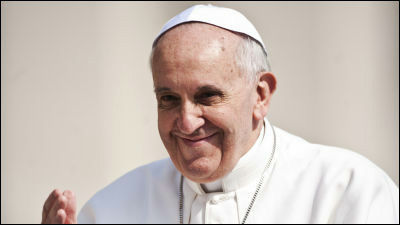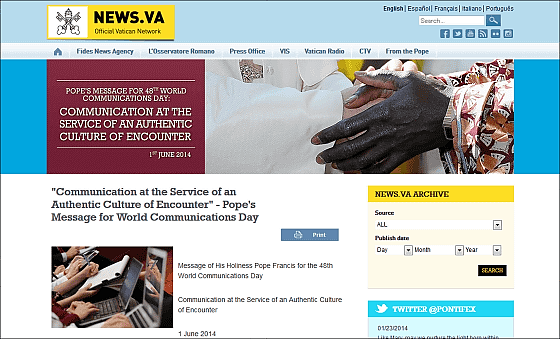프란시스코 교황 '인터넷은 신이 내리신 멋진 선물이다'
페이지 정보
작성자 주임신부 작성일14-03-19 06:44 조회21,188회본문

Pontifical Council for Social Communications
| 48th World Day of Communications "Communication at the service of an authentic culture of encounter." 1 June 2014 |
|
Dear Brothers and Sisters,
Today we are living in a world which is growing ever "smaller" and where, as a result, it would seem to be easier for all of us to be neighbours. Developments in travel and communications technology are bringing us closer together and making us more connected, even as globalization makes us increasingly interdependent. Nonetheless, divisions, which are sometimes quite deep, continue to exist within our human family. On the global level we see a scandalous gap between the opulence of the wealthy and the utter destitution of the poor. Often we need only walk the streets of a city to see the contrast between people living on the street and the brilliant lights of the store windows. We have become so accustomed to these things that they no longer unsettle us. Our world suffers from many forms of exclusion, marginalization and poverty, to say nothing of conflicts born of a combination of economic, political, ideological, and, sadly, even religious motives.
In a world like this, media can help us to feel closer to one another, creating a sense of the unity of the human family which can in turn inspire solidarity and serious efforts to ensure a more dignified life for all. Good communication helps us to grow closer, to know one another better, and ultimately, to grow in unity. The walls which divide us can be broken down only if we are prepared to listen and learn from one another. We need to resolve our differences through forms of dialogue which help us grow in understanding and mutual respect. A culture of encounter demands that we be ready not only to give, but also to receive. Media can help us greatly in this, especially nowadays, when the networks of human communication have made unprecedented advances. The internet, in particular, offers immense possibilities for encounter and solidarity. This is something truly good, a gift from God. This is not to say that certain problems do not exist. The speed with which information is communicated exceeds our capacity for reflection and judgement, and this does not make for more balanced and proper forms of self-expression. The variety of opinions being aired can be seen as helpful, but it also enables people to barricade themselves behind sources of information which only confirm their own wishes and ideas, or political and economic interests. The world of communications can help us either to expand our knowledge or to lose our bearings. The desire for digital connectivity can have the effect of isolating us from our neighbours, from those closest to us. We should not overlook the fact that those who for whatever reason lack access to social media run the risk of being left behind.
While these drawbacks are real, they do not justify rejecting social media; rather, they remind us that communication is ultimately a human rather than technological achievement. What is it, then, that helps us, in the digital environment, to grow in humanity and mutual understanding? We need, for example, to recover a certain sense of deliberateness and calm. This calls for time and the ability to be silent and to listen. We need also to be patient if we want to understand those who are different from us. People only express themselves fully when they are not merely tolerated, but know that they are truly accepted. If we are genuinely attentive in listening to others, we will learn to look at the world with different eyes and come to appreciate the richness of human experience as manifested in different cultures and traditions. We will also learn to appreciate more fully the important values inspired by Christianity, such as the vision of the human person, the nature of marriage and the family, the proper distinction between the religious and political spheres, the principles of solidarity and subsidiarity, and many others.
How, then, can communication be at the service of an authentic culture of encounter? What does it mean for us, as disciples of the Lord, to encounter others in the light of the Gospel? In spite of our own limitations and sinfulness, how do we draw truly close to one another? These questions are summed up in what a scribe - a communicator - once asked Jesus: "And who is my neighbour?" (Lk 10:29). This question can help us to see communication in terms of "neighbourliness". We might paraphrase the question in this way: How can we be "neighbourly" in our use of the communications media and in the new environment created by digital technology? I find an answer in the parable of the Good Samaritan, which is also a parable about communication. Those who communicate, in effect, become neighbours. The Good Samaritan not only draws nearer to the man he finds half dead on the side of the road; he takes responsibility for him. Jesus shifts our understanding: it is not just about seeing the other as someone like myself, but of the ability to make myself like the other. Communication is really about realizing that we are all human beings, children of God. I like seeing this power of communication as "neighbourliness".
Whenever communication is primarily aimed at promoting consumption or manipulating others, we are dealing with a form of violent aggression like that suffered by the man in the parable, who was beaten by robbers and left abandoned on the road. The Levite and the priest do not regard him as a neighbour, but as a stranger to be kept at a distance. In those days, it was rules of ritual purity which conditioned their response. Nowadays there is a danger that certain media so condition our responses that we fail to see our real neighbour.
It is not enough to be passersby on the digital highways, simply "connected"; connections need to grow into true encounters. We cannot live apart, closed in on ourselves. We need to love and to be loved. We need tenderness. Media strategies do not ensure beauty, goodness and truth in communication. The world of media also has to be concerned with humanity, it too is called to show tenderness. The digital world can be an environment rich in humanity; a network not of wires but of people. The impartiality of media is merely an appearance; only those who go out of themselves in their communication can become a true point of reference for others. Personal engagement is the basis of the trustworthiness of a communicator. Christian witness, thanks to the internet, can thereby reach the peripheries of human existence.
As I have frequently observed, if a choice has to be made between a bruised Church which goes out to the streets and a Church suffering from self-absorption, I certainly prefer the first. Those "streets" are the world where people live and where they can be reached, both effectively and affectively. The digital highway is one of them, a street teeming with people who are often hurting, men and women looking for salvation or hope. By means of the internet, the Christian message can reach "to the ends of the earth" (Acts 1:8). Keeping the doors of our churches open also means keeping them open in the digital environment so that people, whatever their situation in life, can enter, and so that the Gospel can go out to reach everyone. We are called to show that the Church is the home of all. Are we capable of communicating the image of such a Church? Communication is a means of expressing the missionary vocation of the entire Church; today the social networks are one way to experience this call to discover the beauty of faith, the beauty of encountering Christ. In the area of communications too, we need a Church capable of bringing warmth and of stirring hearts.
Effective Christian witness is not about bombarding people with religious messages, but about our willingness to be available to others "by patiently and respectfully engaging their questions and their doubts as they advance in their search for the truth and the meaning of human existence" (BENEDICT XVI, Message for the 47th World Communications Day, 2013). We need but recall the story of the disciples on the way to Emmaus. We have to be able to dialogue with the men and women of today, to understand their expectations, doubts and hopes, and to bring them the Gospel, Jesus Christ himself, God incarnate, who died and rose to free us from sin and death. We are challenged to be people of depth, attentive to what is happening around us and spiritually alert. To dialogue means to believe that the "other" has something worthwhile to say, and to entertain his or her point of view and perspective. Engaging in dialogue does not mean renouncing our own ideas and traditions, but the claim that they alone are valid or absolute.
May the image of the Good Samaritan who tended to the wounds of the injured man by pouring oil and wine over them be our inspiration. Let our communication be a balm which relieves pain and a fine wine which gladdens hearts. May the light we bring to others not be the result of cosmetics or special effects, but rather of our being loving and merciful "neighbours" to those wounded and left on the side of the road. Let us boldly become citizens of the digital world. The Church needs to be concerned for, and present in, the world of communication, in order to dialogue with people today and to help them encounter Christ. She needs to be a Church at the side of others, capable of accompanying everyone along the way. The revolution taking place in communications media and in information technologies represents a great and thrilling challenge; may we respond to that challenge with fresh energy and imagination as we seek to share with others the beauty of God.
From the Vatican, 24 January 2014, the Memorial of Saint Francis de Sales.
 |
Pontifical Council for Social Communications - Via della Conciliazione 5 - 00120 Vatican City
Phone +39 0669891800 - Fax +39 0669891840
email pccs@vatican.va - web http://www.pccs.va

프란시스코 교황은 남미에서 처음으로 선출된 교황으로 주목을 받고 있으며 타임지의
2013 올해의 인물」로도 선정되었습니다.
신이 내리신 선물입니다」라고 말했습니다.
"Communication at the Service of an Authentic Culture of Encounter" - Pope's Message for World Communications Day
http://www.news.va/en/news/communication-at-the-service-of-an-authentic-cultu
http://www.news.va/en/news/communication-at-the-service-of-an-authentic-cultu

프란시스코 교황은 「인간은 예전보다 『좁아진』세상에 살고 있으며 글로벌화에 따라 멀리 떨어진 곳에 있더라도 이웃에 있는 것 처럼 커뮤니케이션을 할 수 있습니다」라면서 테크놀로지의 발전이나 전 세계를 여행할 수 있게 된 오늘날, 커뮤니케이션의 미래가 변화하고 있는 점을 언급했습니다.
By Jean-Pierre Dalbera

메시지를 통해 교황은「글로벌한 시점에서 볼 때 전 세계에 차별이나 빈부의 격차를 낳는 요소로 경제・정치・사상・종교까지 가담하고 있는 것도 사실입니다. 그렇기에 이러한 세상에 살고 있다는 점에서 인터넷을 통해서 가족의 단결이나 인간의 존엄한 삶을 보증할 수 있으며 서로를 가깝게 느낄 수 있습니다.」라고 말했으며 커뮤니케이션의 질을 키우고 공유할 수 있는 인터넷에 대해서는「정말 멋진 것입니다. 이것은 신이 내리신 선물입니다」라고 밝혔습니다.

메시지를 통해 교황은「글로벌한 시점에서 볼 때 전 세계에 차별이나 빈부의 격차를 낳는 요소로 경제・정치・사상・종교까지 가담하고 있는 것도 사실입니다. 그렇기에 이러한 세상에 살고 있다는 점에서 인터넷을 통해서 가족의 단결이나 인간의 존엄한 삶을 보증할 수 있으며 서로를 가깝게 느낄 수 있습니다.」라고 말했으며 커뮤니케이션의 질을 키우고 공유할 수 있는 인터넷에 대해서는「정말 멋진 것입니다. 이것은 신이 내리신 선물입니다」라고 밝혔습니다.

교황은 또 「인터넷은 지식을 확장해 주지만 가족이나 친구 등 실제로 가까이 있는 사람들과 멀어질 우려도 있습니다 」라고 말하고 이익과 위험성 양쪽을 인식하고 유연하게 디지털 기술을 다룸으로써 다른 문화와 전통, 언어를 가진 사람들이 서로 이해할 수 있는 「광대한 가능성」을 갖고 있다고 전 세계에 메시지를 전했습니다
Pope Francis to visit South Korea
2014-03-10 Vatican Radio
 (Vatican Radio) It’s official: Pope Francis is going to South Korea. A statement from the Press Office of the Holy See on Monday confirmed that the Holy Father will be traveling to the Republic of Korea from August 14th to August 18th. “Welcoming the invitation from the President of the Republic and the Korean bishops,” the statement reads, “His Holiness Pope Francis will make an Apostolic Voyage to the Republic of Korea from 14 to 18 August 2014, on the occasion of the Sixth Asian Youth Day, to be held in the diocese of Daejeon.” No further details of the trip were immediately available, though the Holy Father has received invitations from, and spoken of his desire to visit a number of countries in the Asia-Pacific region, including Sri Lanka.
(Vatican Radio) It’s official: Pope Francis is going to South Korea. A statement from the Press Office of the Holy See on Monday confirmed that the Holy Father will be traveling to the Republic of Korea from August 14th to August 18th. “Welcoming the invitation from the President of the Republic and the Korean bishops,” the statement reads, “His Holiness Pope Francis will make an Apostolic Voyage to the Republic of Korea from 14 to 18 August 2014, on the occasion of the Sixth Asian Youth Day, to be held in the diocese of Daejeon.” No further details of the trip were immediately available, though the Holy Father has received invitations from, and spoken of his desire to visit a number of countries in the Asia-Pacific region, including Sri Lanka.|
|





